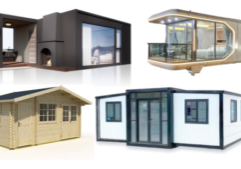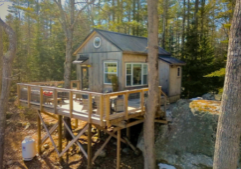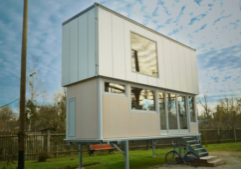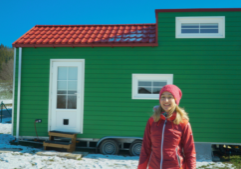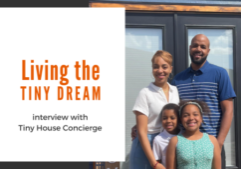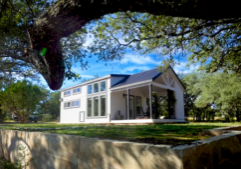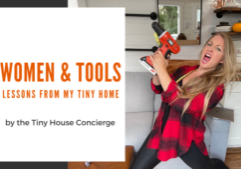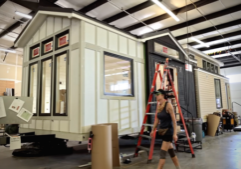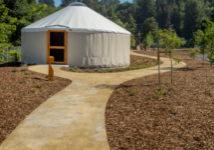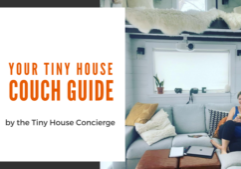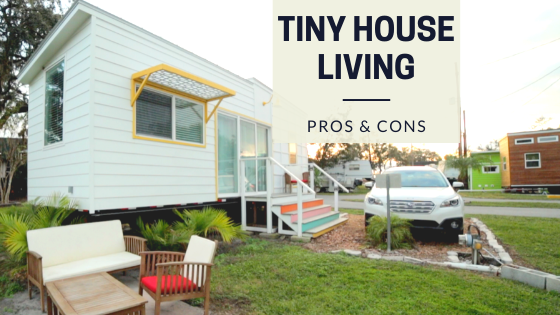
The Pros and Cons of Living in a Tiny House
Is tiny house living right for you? There's many benefits, but it's not for everyone.
For the past several years, the concept of living in tiny houses has become new limelight for people who plan to move out of their parent's house or start a new family. Furthermore, the tiny house movement is the precursor to the exponential growth of people who want to have a sense of economic sustainability, while still living in style.
We like to say, it's made living simply and within your means, sexy again. But it's more than that; tiny house living is an empowerment tool.
In a nutshell, people have now become minimalists when it comes to living to pursue their goals. Due to wanting more sustainability, people are now looking to tiny houses as an alternative to larger, more costly dwellings such as standard McMansions, apartments, and duplexes.
As terrific as it sounds, we all do have to embrace the fact that a tiny house isn't for everyone.
If you're part of the many, who are considering getting a tiny house to full-time residence, here are some pros and cons.
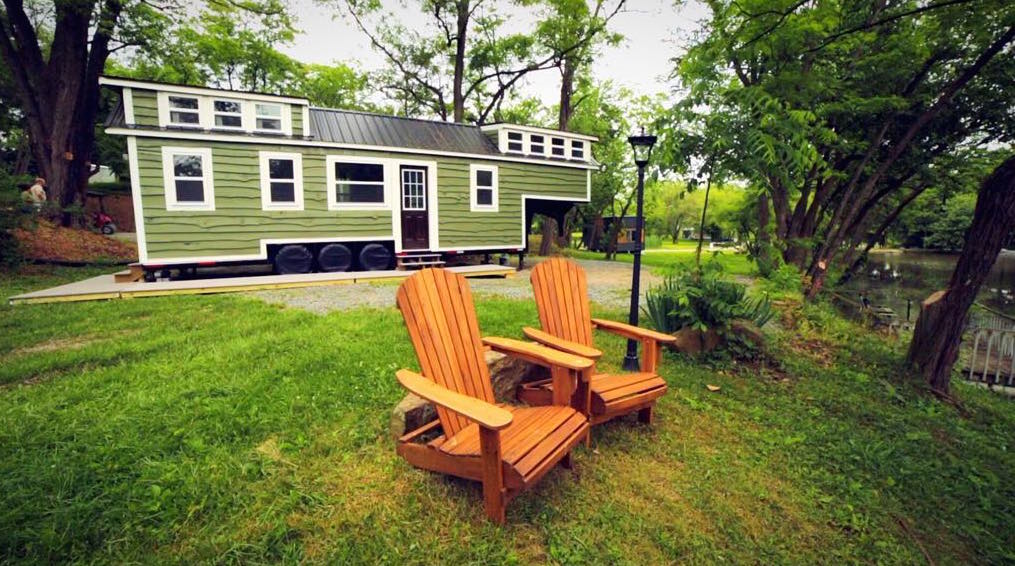
The Pros of Tiny House Living:
Lesser Expenses
Have you ever thought of living in a grand house with your family or just by yourself? Unless you're financially capable or well off, you likely struggle to afford a standard home. If you're short on your budget, one good option is downsizing.
Firms like bma can offer you ideas for your tiny home by looking at their smaller, more compact units—in a familiar apartment form. This will help you stairstep your thinking into more untraditional small spaces, like tiny houses on wheels and container homes.
While a larger house requires higher maintenance and related expenses, a tiny house requires the opposite. Also, larger homes consume more energy; electric and water bills are definitely higher.
Meanwhile, if you have a smaller house, you curtail what is unnecessary. Hence, it is an opportunity for you to invest your money in other ventures such as personal leisure or small business plans.
A tiny house on wheels, in particular, is outside the mainstream real estate market. The result is flexibility in overall upfront cost, from $20,000 DIY to $80,000 pro build, not influenced by land value.
Further, there's a broader affordable range of parking costs, from $300-650 per month with various amenities. To learn more about available options, check out our in-depth tiny house parking guide here.
Mobility
Are you eyeing a house in an overlooking hill or near the shore of a white sand beach? Or planning to travel, but not sure how to afford it? Don't worry because the tiny house is easy to relocate.
A tiny home is a perfect match for travel-minded and adventurous people. With its capacity to hitch easily with trucks, travel is much easier.
There are tiny house designs that are ideal for frequent moves, but all THOWs can be easily relocated to new cities as the desire or need arises.
To learn more about tiny house travel, check out our in-depth how-to guides—valuable insights for DIY towing or hiring professional movers.
Environmentally-Friendly Builds
Housing materials like wood, roofing, and insulation, are indeed essential in building houses. Thus, the bigger the house, the more materials needed. While the smaller the house, the lesser the resources required.
Nature, as the primary source of building materials, has provided the people with all its abundance from the very beginning—as seen in adobe building techniques. However, as modernization paved the way into the 21st century, the need for resources has increased with larger and larger average home size.
And unfortunately, the more wasteful housebuilders have become as well. Devasting amounts of perfectly good materials end up in the landfill every year from new construction overages.
Although tiny homeowners aren't one to sacrifice quality, tiny house materials often come from more sustainable means.
Salvage and nontoxic elements are more common. But more so, they require fewer materials and produce less building waste because of the individualized construction. As a result, environmental footprints from tiny houses are smaller and help protect the well-being of the environment.
Powered-up by Green
Are you tired of seeing your monthly electric bill in your mails? Why not utilize nature's resources to power-up your own home. Commonly, renewable energy sources like solar and wind transform their energies into electricity through solar panels and battery systems.
Since most tiny houses are already more environment-friendly, it only makes sense that sustainable means should also power them. And fortunately, these options are getting more affordable all the time.
Depending on the budget and where they're placed, tiny houses greatly benefit from other green energy sources such as wind turbines and geothermal heating and cooling systems.
The Cons of Tiny House Living:
A Smaller Home Means Lesser Space
If you plan to have a big family, a tiny house may not be the best option. The size of this type of home usually ranges from 60 square feet to 500 square feet. Storage and sleeping spaces are, of course, limited.
Making adequate, functional living space in a tiny, compact house can be difficult for some. But if you don't mind getting creative, the tiny homes could work for you, your significant other, and a couple of kids. Efficient design is the name of the game!
Complicated to Maintain
If you think cleaning up your space is less frequent because it's small, think again. It takes less time to do it but needs to be done daily.
Tiny houses may look compact, but keeping them in perfect shape can take up a bit of work. According to an article published in the New York Times, the smell can linger in a tiny house if not cleaned properly.
You also have to deal with the fact that tiny homes on wheels typically do not have septic tanks and traditional plumbing.
They need an extra bit of commitment when you do decide to live in one—regular RV or composting toilet maintenance is top of mind.
While overall maintenance needs and costs can be less in a tiny house, because each surface, piece of furniture, etc. are used every day, the result is more wear and tear.
Security Issues
Your house might be tiny, but it is a big catch for burglars. Evidently, in Missouri, a woman's tiny house was stolen and found 30 miles away a day later. Although THOWs can easily be relocated, this comes with specific home security needs.
Beyond that, living tiny means, you are more intimately connected with your surroundings due to size and lack of many interior walls. There's a beauty to this, like the feeling of closeness to nature.
On the other hand, this can feel vulnerable. Expect an adjustment period.
And might not be a bad idea to rent a tiny house to get a sense of the overall intimacy of the space in relation to the outdoors. If you find it overly offputting, you might want to consider more remote parking arrangements or a different kind of home.
Takeaway
Imagine enjoying saving half or more on monthly living expenses, or trying out fresh sceneries from the comfort of your own home. With a tiny house, the flexibility to pursue your passions is one of the advantages you can have.
Living in a tiny house does come with advantages, but it's safe to assume that there are realities that you should also consider.
For one, a tiny house can be, well, limiting. While for others, it can be empowering. The pros and cons mentioned above are some of the factors that you should consider when living in a tiny house.
Browse our blog for more insights into tiny house living!
The Ultimate Tiny House Design/Build/Transition Workshop
Sign-up for this acclaimed 16+ hour Digital Tiny House Workshop to learn how to build a tiny house, the legalities to be aware, how to make the transition to living tiny, and more!
INCLUDED with the DIGITAL WORKSHOP:
- 54 bite-sized, engaging episodes
- Downloadable follow-along booklet for note-taking
- Over $300 in FREE bonuses, from tiny house plans to more how to's
- Digital Diploma upon full completion of the course


